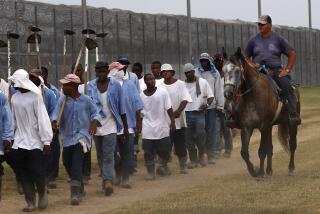Progressive Dutch Prisons Try Humane Punishment
- Share via
HAARLEM, Netherlands — A brightly painted blue door opens, revealing a clean, narrow room with a bed along one wall. A radio is fixed into the opposite wall above bookshelves and there is a toilet in the corner.
Sunshine streams through a window, which has no bars even though the room is a cell. The room houses one of 230 inmates at a remand prison in this town west of Amsterdam.
“People go to prison as a punishment, but we try to ensure that being here doesn’t cause any more harm than is necessary,” prison warden John van Putten said.
Built in the last century, “De Koepel” (The Dome)--the name comes from its distinctive glass roof--has just been refurbished for $20 million with work and recreation areas updated and visiting rooms improved.
It typifies the relaxed Dutch penal system, which guarantees each prisoner his own cell--for which he can rent a television and where perks can include private conjugal visits.
The Justice Ministry puts the prison population at just 7,000, out of nearly 15 million people in the Netherlands. That is less than half the number per capita of Belgium, France and Britain.
De Koepel, near Amsterdam’s Schiphol Airport, houses inmates from up to 50 nationalities. They include many drug couriers who were attracted by the country’s renowned liberal approach to drugs.
Possession of soft drugs has effectively been decriminalized in the Netherlands but cocaine and heroin smugglers face lengthy jail sentences if caught.
Van Putten estimates that some 40% of his prisoners are dependent on hard drugs.
“Drugs are a growing problem and it also cannot be denied that prisoners are getting more violent, but compared to other countries we can’t really complain,” he said.
Like many of his colleagues, he is loath to contemplate a stricter regime for violent inmates.
“Why punish everybody for one bad apple? If you make things tougher, you only create a vicious circle of violence,” he said.
De Koepel’s inmates are free to dress as they please and can spend large chunks of the day out of their cells.
“Prisoners can work a half day. If they don’t want to work, they stay in their cells. It’s up to them,” Van Putten said.
In the afternoons they choose from activities including sports, educational courses or painting and pottery courses.
The system is not cheap. It can cost more than $115 a day to keep a prisoner, and the ratio of staff to inmates is high.
Van Putten’s total staff of 160 includes 100 guards. He emphasizes the care taken to select and train guards.
“If we want to hire people, we have an open day and they come and talk to me and other officers. In the end, out of 100 applicants, we maybe end up taking three,” he said.
Young recruits are given time off to study alongside nurses and care workers for a professional qualification.
Van Putten also avoids over-reliance on young officers.
“With young men you tend to create a macho culture,” he said. “If you hire older people who’ve worked elsewhere, then maybe the prisoners look up to them more.”
Communication is seen as vital, with inmates represented on committees to raise complaints with prison authorities.
Van Putten sees a lack of communication as one of the main failings in other penal systems, such as in Britain, where earlier this year there were riots at Manchester’s Strangeways prison and inmate protests at several others.
“I spent a day in Strangeways and saw prisoners cleaning a wing. The warders didn’t speak to them all day,” he said.
Van Putten also said he believes prison disturbances are symptomatic of a violent strain in British society, which has also spawned race riots and soccer hooliganism over the last decade.
For him the Dutch approach is vastly preferable, although he remains doubtful about the chances of prison improving people.
“If you believe we are here to improve people, then I think we fail,” he said. “But if people want to improve, they have the chance.”
More to Read
Sign up for Essential California
The most important California stories and recommendations in your inbox every morning.
You may occasionally receive promotional content from the Los Angeles Times.













